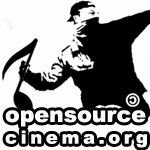I’m a little late on this one, but in case you missed it:
 This documentary film was forwarded to me by my father, a professor/academician/scholar/ and self-pronounced egghead who specializes in the relationships between philosophy, theology, ethics, popular culture and preaching. The film, a product of Open Source Cinema, is called “RiP: A remix Manifesto“, and touts itself as
This documentary film was forwarded to me by my father, a professor/academician/scholar/ and self-pronounced egghead who specializes in the relationships between philosophy, theology, ethics, popular culture and preaching. The film, a product of Open Source Cinema, is called “RiP: A remix Manifesto“, and touts itself as
. . . an open source documentary about copyright and remix culture. Created over a period of six years, the film features the collaborative remix work of hundreds of people who have contributed to this website, helping to create the world’s first open source documentary.
The film is a commentary focusing on copyright law from a perspective that often doesn’t get the opportunity to be heard: the social, or culture, perspective. While the film is itself a product of open source methods, it speaks on copyright law and the era of remix made available by technological advances and the never-ending societal thirst for free ideas and information. The central question is whether copyright increases or inhibits creation. Or does it simply protect creation, in which case an argument could be made whether protection includes either of these results?
Of the documentary’s thirteen chapters, there is one that captured my attention: “Preachers, Lawyers, and Criminals” (obvious why it caught my father’s attention as well). This chapter features Larry Lessig (note the similarities between his pose and my father’s), the acclaimed Stanford professor, scholar, and voice for open source methods. After all, it was Lessig’s own manifesto that sparked the documentary. The film follows Lessig on a trip to China and sits him down for a few notable words on his attack against the U.S. Copyright Law system. See this chapter:
While quite a few professionals disagree with Lessig’s position (and I will neither take a position for or against on this post, although papers I have published in the past seem to give my position away), we can all learn from his work, which speaks for an important perspective in the copyright conversation - the future artists that don’t already own copyrights, but will one day. We can also all learn by watching all thirteen chapters of RiP: A remix Manifesto.
A few words from Open Source Cinema will provide context before viewing:
Imagine a world where ideas and culture, from “Happy Birthday” to Mickey Mouse, are horded under lock and key by copyright laws. Even ideas that could lead to a cure for cancer would be off-limits. Stop imagining now, because this is the world you live in. Although pop culture giants such as Walt Disney and the Rolling Stones built on the past to produce their art, the door is closing behind them.
I’ve been making a documentary for over 6 years that explores this issue: RiP: A Remix Manifesto.
Digital technology has opened up an unprecedented global economy of ideas. RiP explores the robber barons and revolutionaries squaring off across this new frontier as the film journeys from the hallways of Washington to the favelas of Brazil. Our central protagonist is Gregg Gillis, the Pittsburgh biomedical engineer who moonlights as Girl Talk, a mash-up artist rearranging the pop charts’ DNA with his incongruous entirely sample based songs. Along the way, I met key figures on the complexities of intellectual property in the digital era, among them Creative Commons founder Lawrence Lessig, culture critic Cory Doctorow, Brazilian musician and Minister of Cultural Affairs Gilberto Gil, and Jammie Thomas, the single mom successfully sued by the RIAA for illegal downloading.
Copyright law is important, if not necessary, but the question we will always ask is this: on a Laffer curve exemplifying copyright’s scope along the X-axis, and creation’s output on the Y-axis, what is the optimal point of protection? Any takers?
 Ian McClure is a former corporate & securities and intellectual property law attorney with
Ian McClure is a former corporate & securities and intellectual property law attorney with  Trevor M. Blum is a former Associate in the Chicago-based, valuation practice group of Ocean Tomo, LLC., an intellectual property (IP) consultancy. Additionally, he provided instrumental research support to Intellectual Property Exchange International, Inc., an IP exchange start-up. Trevor holds a B.S. from Indiana University and is currently an MBA candidate at the University of Cambridge, focusing on international business and finance. His interests also include entrepreneurship, economics, and informational visualization. He enjoys running and cycling in his free time. Trevor seeks to bring a transnational business perspective to the blog.
Trevor M. Blum is a former Associate in the Chicago-based, valuation practice group of Ocean Tomo, LLC., an intellectual property (IP) consultancy. Additionally, he provided instrumental research support to Intellectual Property Exchange International, Inc., an IP exchange start-up. Trevor holds a B.S. from Indiana University and is currently an MBA candidate at the University of Cambridge, focusing on international business and finance. His interests also include entrepreneurship, economics, and informational visualization. He enjoys running and cycling in his free time. Trevor seeks to bring a transnational business perspective to the blog. 
No Comments, Comment or Ping
Reply to “Documentary - Lawrence Lessig, copyright, and remix culture”